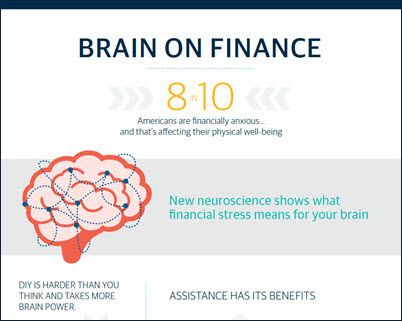
2017 Brain on Finance Study
 |
Thinking about important financial decisions doesn’t just stress people out – it actually impacts their brain function, according to new research released by Northwestern Mutual. And that mental stress can often lead to poor decision making.
The Brain on Finance Study revealed that providing assistance with financial scenarios can actually improve brain function and help enhance cognitive responses:
- Neural signals associated with relaxation and recognition increased by 20.8% and 28.6%, respectively, for “assisted” scenarios compared to “unassisted” scenarios.
- Neural signals associated with attentional demand tended to be 20.0% higher (i.e., more difficult or stressful information processing) during “unassisted” scenarios versus “assisted” scenarios.
Northwestern Mutual partnered with ThinkAlike Laboratories, a neuroscience research firm led by Sam Barnett, Ph.D., who is also a researcher at Northwestern University, to measure the electrical activity of people’s brains when they are evaluating various financial scenarios.
This new brain research was prompted by recent findings from Northwestern Mutual’s annual research—The Planning and Progress Study—that revealed Americans’ high levels of financial anxiety. The 2017 study found that, regardless of age, at least eight in 10 U.S. adults feel some anxiety due to the rising cost of healthcare, unplanned financial and health emergencies, income and savings.
Neuroscientists found the guidance and assurance of financial assistance affected the brain in three important ways:
- ATTTENTIONAL DEMAND: HOW MUCH CONCENTRATION IS NEEDED
When comparing times when people received assistance with having to make decisions on their own, researchers found the latter situations led to brain signals associated with 20% more effort to pay attention during decision-making. In other words, people concentrated significantly harder when facing financial scenarios without assistance. With assistance, their brains appeared to have an easier time, which helped individuals make better decisions.
- RECOGNITION: UNDERSTANDING, REMEMBERING AND GETTING IT RIGHT
During assisted financial scenarios, people experienced a 28% stronger ability to recognize and understand the crucial concepts they were considering, making for clearer and more effective decision-making than without any assistance.
- RELAXED ATTENTIONAL CONTROL: LESS STRESS FOR CLEARER THOUGHTS
Not only did assisted scenarios provide better mental clarity and understanding, but assistance helped people be nearly 21% more relaxed and able to focus calmly compared to when they did not receive assistance. Put simply, when individuals were guided through the decision-making process, they were 21% less stressed than when they were unassisted.
Northwestern Mutual, in partnership with ThinkAlike Laboratories LLC, devised a quiz to provide an idea of how one can measure in comparison to study participants. To learn about this neuroscience study and watch a video, visit brainonfinance.com.